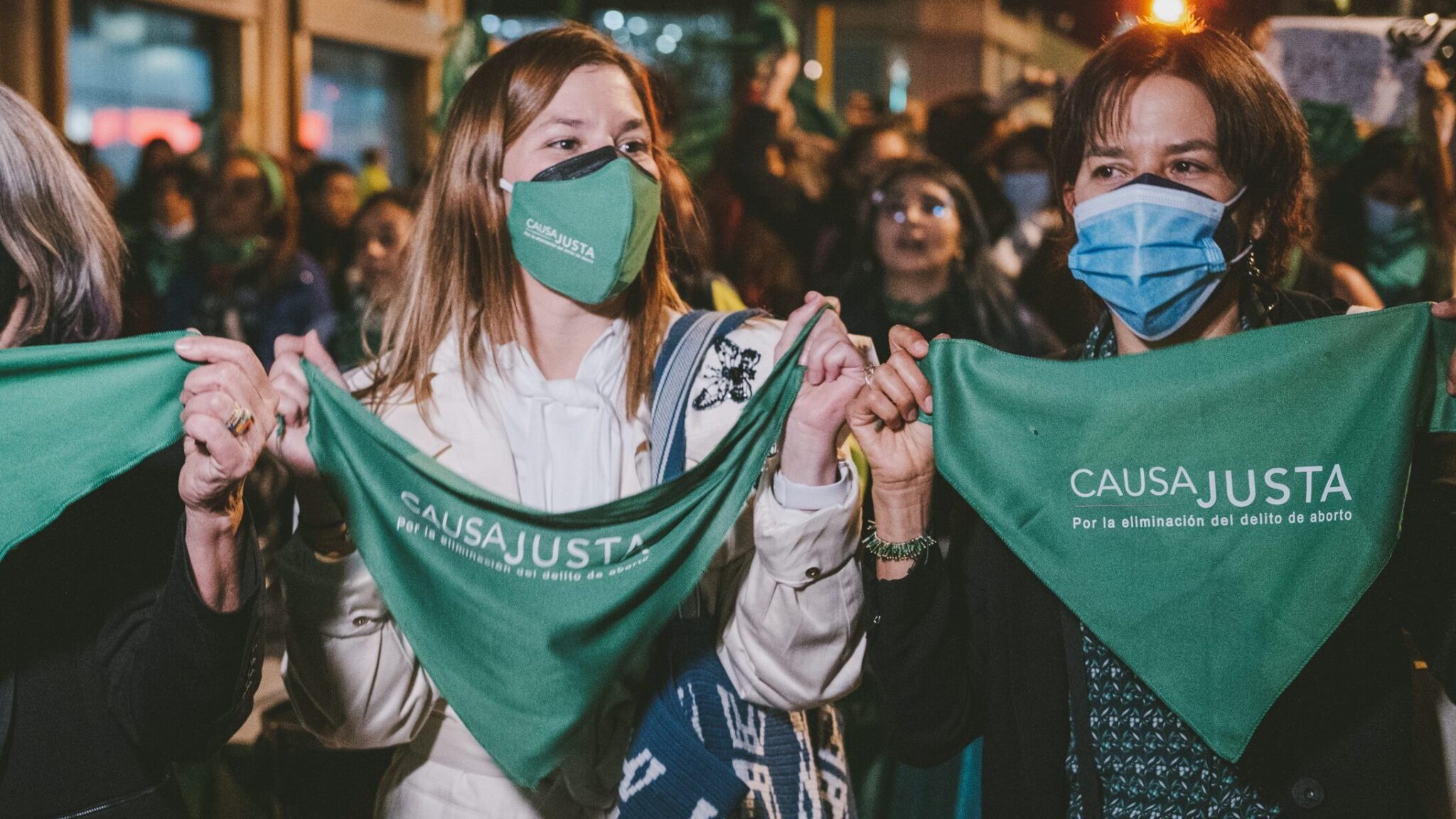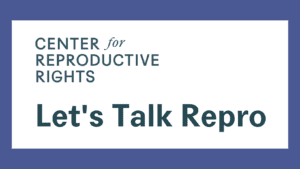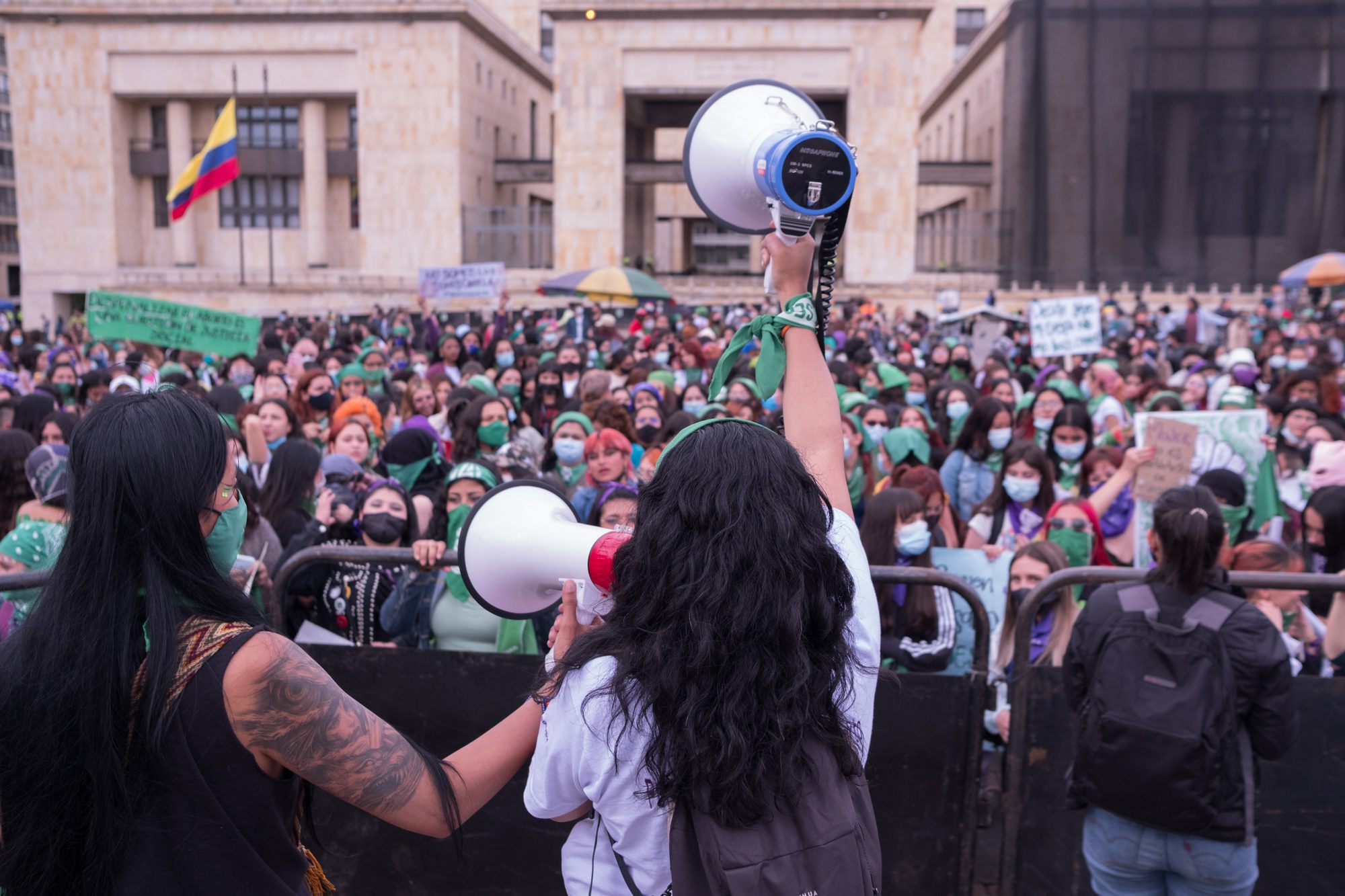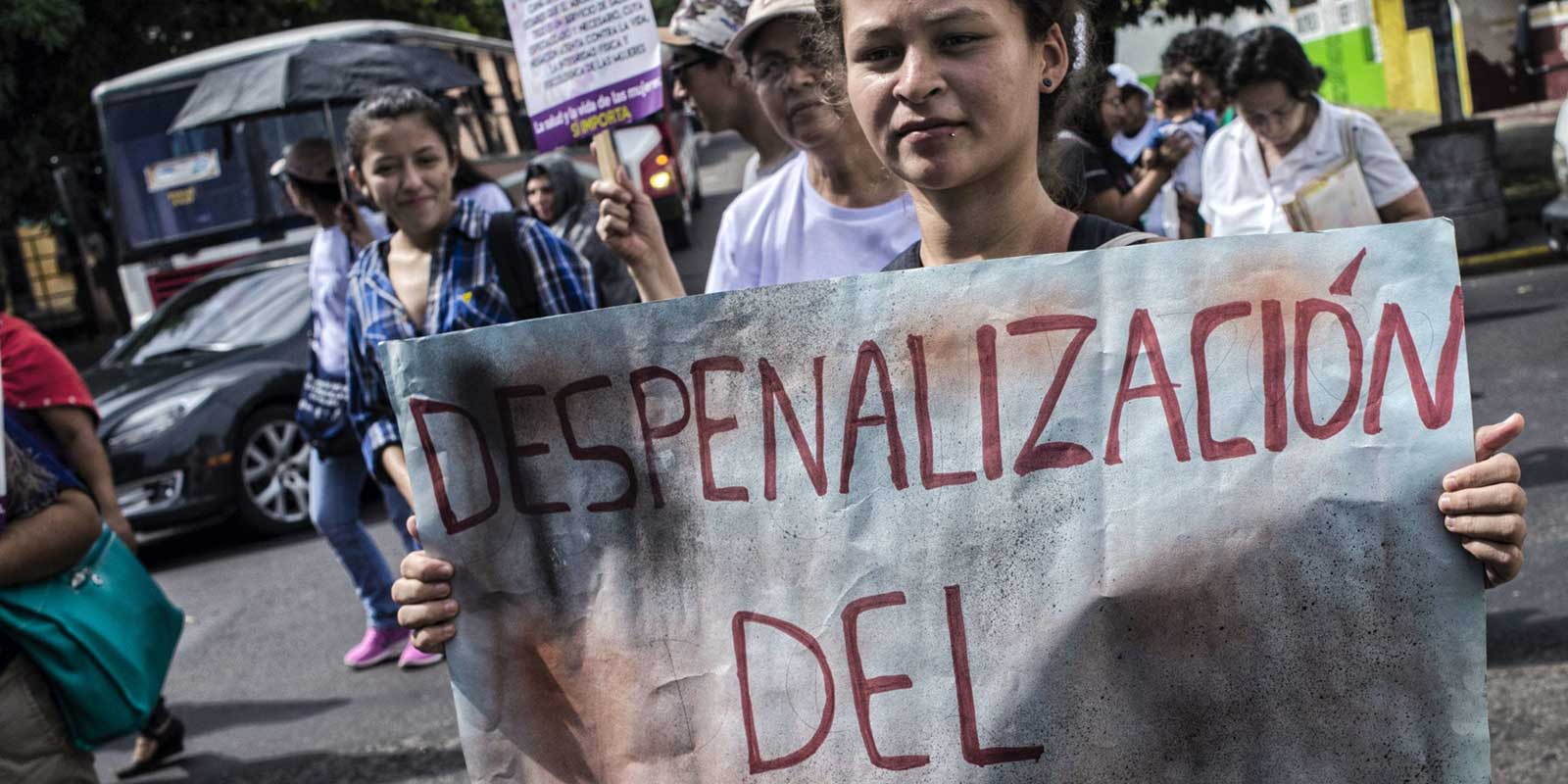“Let’s Talk Repro” Series: Making Waves in Colombia with Catalina Martínez Coral
Regional Director Catalina Martínez Coral discusses her work expanding abortion access in Latin America and the Caribbean.

“Let’s Talk Repro” is a new series highlighting Center professionals and their work. This is the second article in the series.
Name: Catalina Martínez Coral
Title: Regional Director for Latin America and the Caribbean
Pronouns: She/her
Years at the Center: 7
Catalina Martínez Coral is a Colombian feminist and the Regional Director for Latin America and the Caribbean at the Center for Reproductive Rights. In her role at the Center, Catalina oversees the organization’s overall strategies in the region on litigation, advocacy and communication work and is responsible for mobilizing resources to ensure successful delivery and sustainability of the Center’s mandate. She leads the Center’s involvement in Causa Justa, the movement that decriminalized abortion in Colombia in 2022, and is also part of the Niñas No Madres, a regional movement for the rights of Latin American girls.
Before joining the Center in 2015, Catalina worked at the Inter-American Commission on Human Rights as a human rights specialist.
Listen to this audio clip and read below as Catalina discusses her work at the Center, recent wins that have inspired her, her goals for the future, and more.
Q. What brought you to the Center for Reproductive Rights?
A. After I finished my studies, I decided to focus my life on working for justice, freedom, and equity. While working at the Inter-American Commission on Human Rights, I had the opportunity to work on one of the Center’s cases, a case in Peru on sexual violence. I got to know the mission of the Center and their work before the human rights system to build standards around sexual and reproductive rights. I was very impressed and I really, really wanted to be part of it. I especially liked the Center’s frame on human rights, but I also admired all the strategies that the Center was using, not only litigation, but advocacy and communications. And now I’m here, and I am very happy to be able to contribute to very important cultural and social changes through the work that we do at the Center.
Q. What are you focused on in your work right now?
A. As the head of the Latin America and the Caribbean (LAC) program of the Center, I lead all our strategies in the region. We have four key strategies in Latin America right now.
The first one is around abortion, with two dimensions: to end the total bans in countries where abortion is illegal, and to further liberalize abortion laws in countries where there are some legal protections.
The second strategy is around guaranteeing access to a full range of reproductive care to girls and adolescents. And here we work not only on abortion but also on the obligation that States have to guarantee comprehensive sexual education so that young people can understand the implications of sexual violence and the importance of being able to make decisions about their lives and bodies.
The third strategy is guaranteeing access to quality maternal health care, specifically establishing that obstetric violence—violence that women suffer during maternal health care—is a violation of human rights and advancing public policies that address discrimination and mistreatment in public health institutions. We are building guarantees for women’s autonomy over pregnancy and childbirth decisions.
The fourth strategy is at the nexus of environmental justice and reproductive health. We are working on how environmental degradation—for example, the use of toxins in agriculture and in humanitarian settings—is causing reproductive damage to women and girls.
Q. How do you partner with other organizations to expand access to reproductive care in LAC?
A. The Center works in 12 countries across LAC, and we have established partnerships with leading national and local organizations in each country. The Center brings technical expertise on human rights standards, but we recognize that the political fight and the social transformation is being done by our partners in each country.
For example, in Colombia, we partnered with many organizations to build a movement of more than 100 organizations and 150 activists across the country: the Causa Justa Movement. This movement worked for many years to establish strategies to decriminalize abortion in Colombia. We joined this work thanks to La Mesa por la Vida y la Salud de las Mujeres, the most important national reproductive rights organization in Colombia. Not only did we litigate the case before the Constitutional Court to win the decriminalization of abortion in Colombia, but we also established advocacy, communications, and mobilization strategies, so that this conversation around abortion was present in the public discussion. At the end of this important, collective work, we won our case before the Constitutional Court with a very important decision that decriminalized abortion up to 24 weeks in Colombia.
Q. Why is it important that reproductive rights issues are connected on a global scale?
A. Everything that is happening in one country can be an example of how we can work in other places. I think the win in Argentina inspired the win in Mexico, and the win in Mexico inspired the win in Colombia, and we hope that all of these will be also an example for other countries worldwide. In the Global South we are learning valuable lessons on strategy and making real change that we hope can inspire other countries, including in the Global North. Comparative law, policies, and mobilizations can inspire others to act. What we do before global human rights bodies is also very important: the decisions made by human rights institutions have very important effects on what is happening at the national level.
For example, K.L. v. Peru and L.C. v. Peru were the first two decisions on abortion made by a human rights body. These are very important decisions because they established standards that have been used by national courts worldwide to take important steps toward the legalization or liberalization of abortion. We need to recognize how this conversation at the international and regional levels is also influencing legal changes at the domestic level in countries across the region.
“In the Global South we are learning valuable lessons on strategy and making real change that we hope can inspire other countries, including in the Global North.”
Read more about the ruling to decriminalize abortion in Colombia.
Q. How can people participate and support in advancing the conversation about reproductive health care in LAC?
A. Everyone plays an important role in this world that we want to create, a world where women are free to make decisions over their bodies, where women are not discriminated against for being women, and where we have dignity as human beings. In order to build that world, we all need to collaborate. People can be involved in these issues in many ways, like talking with their families and friends about why this is important. If there are people that have some doubts, inform them. The reality is that there is a lot of misinformation, so we have a very important role to play in sharing information and in explaining why the fight for reproductive rights is important.
Right now, we have so many movements like the Green Wave, for example, in Latin America, that are being replicated in many parts of the world. You can also wear a symbol like the green scarf. It is very beautiful how for example, when I am in public transportation in Bogota and I see someone wearing a green scarf, I know that there is a community there, that we are part of something even if I don’t know that person. So I think those actions that can seem small are very big because we are creating community, and this is all that this work is about: creating that community and that solidarity between us.
Q. Can you describe the moment when you heard the news that Constitutional Court of Colombia decriminalized abortion? Where were you, who were you with, what were you feeling?
A. The decision came on February 21 last year, and we didn’t have any idea that the decision was coming. We had been waiting for many months, and each time that the court was discussing the case, we were out in front of the court. I wasn’t expecting a decision that day, so I decided not to go to court. Around 9:00 AM, a colleague from the Causa Justa movement wrote to me saying it is important that you come because I think a decision is going to be made today. When I arrived at court, there were already a lot of people, many activists from the movement, all the people with green scarves and balloons that said Casa Justa, and a lot of people arriving with posters.
We received the message that the judges made the decision: although they didn’t completely eliminate abortion as a crime, they decriminalized abortion up to 24 weeks of pregnancy. And the party began. We were so happy and excited, jumping and celebrating. We had music and we were in front of the court celebrating our freedom. It was a very, very beautiful moment.

Q. How has the stigma surrounding abortion in Colombia changed since the ruling, and what more needs to be done to eliminate it?
A. A lot of positive things have happened since the decision, but we cannot ignore that implementation is very complicated in a country where abortion continues to be a stigma. That is why it is so important to continue to work on cultural transformation and on the social decriminalization of abortion. We know that, for example, in cities such as Bogotá, Cali or Medellín, it is easier to get an abortion, but this is not the case for the majority of women in the country that live in the most vulnerable conditions and are part of historically marginalized groups. So, the challenge now is to guarantee that all women are able to access the service, whether urban or rural, because at the end of the day, this is a matter of discrimination.
Q. What steps has the Center taken to ensure the decriminalization ruling is being upheld and respected in Colombia?
The Center is playing a very important role by being part of the implementation at the national level in Colombia and by elevating this conversation to regional and international spaces. We don’t have a human rights standard at the international or regional level around the fact that abortion needs to be decriminalized. The World Health Organization has recommended it, but we don’t have a human rights body that has made this statement. It’s very important for us to engage in these spaces before the UN, the Inter-American Commission, and the Inter-American Court on Human Rights to elevate and build this standard. We need human rights bodies to say clearly that it is not only that total bans on abortion constitute a human rights violation, but it’s also that criminalization of abortion has negative effects on the lives of women, creating further human rights violations.
Q. What lessons or strategies from the Green Wave in Latin America could be applied by reproductive rights advocates across the world to further advance abortion rights in their country?
A. I think that the Green Wave is here to inspire. We are more than open to having conversations with activists in other countries and in other regions if it would be useful for them to learn from us. I think that the most important thing is to be able to build those conversations, to know what the needs of the movements in other parts of the world are, and to see how some of the strategies that we used and that we are using in Latin America can be useful for others. We are here to do that collaboration of course because we are part of the same community, and we are fighting for the same values, and I think that that is a very important and strong tide that we have.



